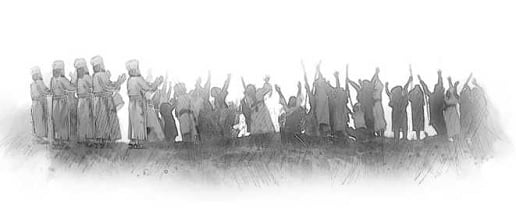Sabbath: Worshiping the Lord
Read for This Week’s Study: Neh. 12:27-47; 1 Chron. 25:6-8; 1 John 1:7-9; John 1:29, John 1:36; 1 Cor. 5:7; Heb. 9:1-11.
Memory Text: “And they sang responsively, praising and giving thanks to the LORD: ‘For He is good, for His mercy endures forever toward Israel’ ” (Ezra 3:11, NKJV).
This week’s memory text gives us insight into the Hebrews’ worship practices and how their gratitude toward God had overflowed in praise to Him. In 515 B.C. they celebrated the dedication of the new temple (Ezra 6:15-18) and then, about 60 years later, the people celebrated the dedication of Jerusalem’s completed wall (Neh. 6:15-7:3; Neh. 12:27 onward).
Following the listing of genealogies in Nehemiah chapters 11 and 12, the author transitions to the time when they celebrated the dedication of the city wall. It was customary for the nation to dedicate things to God: the temple, a city wall, or even houses and public buildings. Such a dedication was thoughtfully prepared and was accompanied with singing, music, feasting, sacrifices, rejoicing, merriment, and the purification of the people. David established the practice of sacrifices during a dedication, and afterwards Israel’s leaders followed his example, starting with Solomon when he brought the ark into the temple (1 Kings 8:5).
This week we will look at how they worshiped the Lord during this time and see things that we, who worship the same Lord, can apply to ourselves.


A feature of ancient Israeli music was antiphonal singing where groups of people sang responsively to one another. I understand that in Solomon’s temple they had 24 groups comprising some 288 voices to provide festive music. Even singing that could be regarded as congregational singing had an antiphonal quality about it with the cantor leading followed by the congregation responding. Obviously in those days they did not have songbooks or hymnals for every one to follow so the cantor played an important role in providing the words.
I have heard reconstructions of ancient antiphonal singing and it has a beautiful haunting quality that leads you to think that you have experienced to something special.
Here is a sample reconstruction of Psalms 19 for you to listen to. You may have to press “Skip Ad” to get to the music.
https://www.youtube.com/watch?v=M86lEfmVsEY
The Hebrews had a special relationship with music and it is worth noting that some of the Psalms were exilic and post-exilic in origin.
The deliverance of the people from bondage will always lead to praise and worship.
Unlike the slavery in Egypt, this bondage was brought upon the people because of their disobedience.
They had worshiped other gods thus the curse given in the book of the law had been executed on the people
In captivity, they knew it was God who had moved upon the heart of the heathen king (unbeliever) to provide deliverance to the people.
Just as God had promised laying of the foundation is taking place proving God’s goodness.
Their song must have been Psalms 136.
No one on this earth can enter into true worship without experiencing the deliverance from sin.
We are all born as a slave to sin.
In Christ we are set free from sin.
Being made free in Christ, are we working to rebuild the temple of God?
Holy Spirit thanks thanks thanks thanks thanks and never ending thanks. Thanks for all your love and mercies towards me.
I will sing of the mercies of the Lord for ever I will sing of his mercies. Many people go to church but do not talk their testimonies but instead sing it. Great is thy faithfulness O God my father. God had done great and marvelous things for his people and they sang about it.
Exodus 15 tells how Moses and the Israelites sang before the Lord. Marian and the ladies took to the streets and sang about how the mighty warrior triumph.
The harder the battles, the sweeter the victories. Many have grown up with a golden spoon, no struggles, nothing to worry about, food, clothing, housing at their disposal. Good schools to choose from, family had money and wealth. All was well, therefore many have nothing to sing about.
When we look at the Bible from Genesis- Revelation almost all times singing occurs after a victory from hardships. Look at Rev 15: 3 the Crowning experience of all Christians. Those who were singing were those who got the victory over the beast, his image, his mark and his name.
No testimony without a test.
Lyn, I agree with you that it is the overcomer who has reason to praise the LORD like we see in the 7 churches of Revelation.
I agree us as humans tend to remember and turn to the LORD when we have trials and worship Him when He saves. However I notice in the Bible and in my life the hardest battle is to maintain a relationship with the LORD when one is comfortable.
I agree with you also ladies, but I have noticed in church, folks find it hard to give God thanks and praise for one thing in the life and they find it difficult to do when asked. Is it because we are too comfortable as a people so we take thing for granted? It is something that disturbs me when it happens.
John 4:23–24.
“The hour is coming, and is now here, when the true worshipers will worship the Father in spirit and truth, for the Father is seeking such people to worship him. God is spirit, and those who worship him must worship in spirit and truth.”